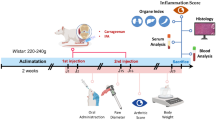Abstract
Curcumin is a phenolic natural product isolated from the rhizome of Curcuma longa (turmeric). We evaluated the effects of curcumin on the development of dextran sulfate sodium (DSS)-induced experimental colitis. BALB/c mice were fed a chow containing either 3.5% (wt/wt) DSS or 3.5% DSS + 2.0% (wt/wt) curcumin. The body weight loss was more apparent in DSS-treated mice than in DSS + curcumin-treated mice. The disease activity index, histological colitis score, and MPO activity were all significantly higher in DSS-treated mice than in DSS plus curcumin-treated mice. Microscopically, mucosal edema, cellular infiltration, and epithelial disruption were much more severe in DSS-treated mice than in DSS + curcumin-treated mice. In DSS + curcumin-treated mice, NF-κB activation was blocked in the mucosa. In conclusion, the development of DSS-induced colitis was significantly attenuated by curcumin. Being a nontoxic natural dietary product, curcumin could be useful in treatment of IBD patients.






Similar content being viewed by others
References
Baldwin AS Jr (1996) The NF-kappa B and I kappa B proteins: New discoveries and insights. Annu Rev Immunol 14:649–6832
Bauer P, Russell JM, Granger DN (1999) Role of endotoxin in intestinal reperfusion-induced expression of E-selectin. Am J Physiol 276:G479–G484
Bharti AC, Donato N, Singh S, Aggarwal BB (2003) Curcumin (diferuloylmethane) down-regulates the constitutive activation of nuclear factor-kappa B and IkappaBalpha kinase in human multiple myeloma cells, leading to suppression of proliferation and induction of apoptosis. Blood 101:1053–1062
Cooper HS, Murthy SN, Shah RS, Sedergran DJ (1993) Clinicopathologic study of dextran sulfate sodium experimental murine colitis. Lab Invest 69:238–249
Duvoix A, Blasius R, Delhalle S, Schnekenburger M, Morceau F, Henry E, Dicato M, Diederich M (2005) Chemopreventive and therapeutic effects of curcumin. Cancer Lett 223:181–190
Garcea G, Berry DP, Jones DJ, Singh R, Dennison AR, Farmer PB, Sharma RA, Steward WP, Gescher AJ (2005) Consumption of the putative chemopreventive agent curcumin by cancer patients:assessment of curcumin levels in the colorectum and their pharmacodynamic consequences. Cancer Epidemiol Biomarkers Prev 14:120–125
Gescher A, Pastorino U, Plummer SM, Manson MM (1998) Suppression of tumour development by substances derived from the diet—mechanisms and clinical implications. Br J Clin Pharmacol 45:1–12
Han SS, Keum YS, Seo HJ, Surh YJ (2002) Curcumin suppresses activation of NF-kappaB and AP-1 induced by phorbol ester in cultured human promyelocytic leukemia cells. J Biochem Mol Biol 35:337–342
Hanauer SB (1996) Inflammatory bowel disease. N Engl J Med 334:841–848
Jian YT, Wang JD, Mai GF, Zhang YL, Lai ZS (2004) Modulation of intestinal mucosal inflammatory factors by curcumin in rats with colitis. Di Yi Jun Yi Da Xue Xue Bao 24:1353–1358
Kim GY, Kim KH, Lee SH, Yoon MS, Lee HJ, Moon DO, Lee CM, Ahn SC, Park YC, Park YM (2005) Curcumin inhibits immunostimulatory function of dendritic cells: MAPKs and translocation of NF-kappa B as potential targets. J Immunol 174:8116–8124
May MJ, Ghosh S (1998) Signal transduction through NF-kappa B. Immunol Today 19:80–88
Podolsky DK (2002) Inflammatory bowel disease. N Engl J Med 347:417–429
Rath HC, Herfarth HH, Ikeda JS, Grenther WB, Hamm TE Jr, Balish E, Taurog JD, Hammer RE, Wilson KH, Sartor RB (1996) Normal luminal bacteria, especially Bacteroides species, mediate chronic colitis, gastritis, and arthritis in HLA-B27/human beta2 microglobulin transgenic rats. J Clin Invest 98:945–953
Salh B, Assi K, Templeman V, Parhar K, Owen D, Gomez-Munoz A, Jacobson K (2003) Curcumin attenuates DNB-induced murine colitis. Am J Physiol Gastrointest Liver Physiol 285:G235–G243
Sharma RA, Gescher AJ, Steward WP (2005) Curcumin: The story so far. Eur J Cancer 41:1955–1968
Sharma RA, Ireson CR, Verschoyle RD, Hill KA, Williams ML, Leuratti C, Manson MM, Marnett LJ, Steward WP, Gescher A (2001) Effects of dietary curcumin on glutathione S-transferase and malondialdehyde-DNA adducts in rat liver and colon mucosa: Relationship with drug levels. Clin Cancer Res 7:1452–1458
Singh S, Aggarwal BB (1995) Activation of transcription factor NF-kappa B is suppressed by curcumin (diferuloylmethane) [corrected]. J Biol Chem 270:24995–25000
Sreejayan Rao MN (1997) Nitric oxide scavenging by curcuminoids. J Pharm Pharmacol 49:105–107
Stoner GD, Mukhtar H (1995) Polyphenols as cancer chemopreventive agents. J Cell Biochem Suppl 22:169–180
Sugimoto K, Hanai H, Tozawa K, Aoshi T, Uchijima M, Nagata T, Koide Y (2002) Curcumin prevents and ameliorates trinitrobenzene sulfonic acid-induced colitis in mice. Gastroenterology 123:1912–1922
Taub DD, Turcovski-Corrales SM, Key ML, Longo DL, Murphy WJ (1996) Chemokines and T lymphocyte activation:I. Beta chemokines costimulate human T lymphocyte activation in vitro. J Immunol 156:2095–2103
Ukil A, Maity S, Karmakar S, Datta N, Vedasiromoni JR, Das PK (2003) Curcumin, the major component of food flavour turmeric, reduces mucosal injury in trinitrobenzene sulphonic acid-induced colitis. Br J Pharmacol 139:209–218
Xu YX, Pindolia KR, Janakiraman N, Chapman RA, Gautam SC (1997) Curcumin inhibits IL1 alpha and TNF-alpha induction of AP-1 and NF-kB DNA-binding activity in bone marrow stromal cells. Hematopathol Mol Hematol 11:49–62
Author information
Authors and Affiliations
Corresponding author
Rights and permissions
About this article
Cite this article
Deguchi, Y., Andoh, A., Inatomi, O. et al. Curcumin Prevents the Development of Dextran Sulfate Sodium (DSS)-Induced Experimental Colitis. Dig Dis Sci 52, 2993–2998 (2007). https://doi.org/10.1007/s10620-006-9138-9
Received:
Accepted:
Published:
Issue Date:
DOI: https://doi.org/10.1007/s10620-006-9138-9




